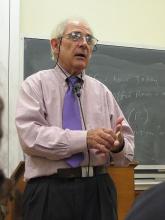The program begins to applause from the live audience in The Marsh Theater in Berkeley, and Ken kicks things off by asking a deceptively simple question: How do words work? Or, to put it another way: how do we go from noise to meaning? John makes a first attempt at answering: “It’s a miracle!” he jokes. But as the two hosts talk, the fascinating way that words (and sentences) can have such complicated meanings does indeed start to seem rather miraculous—especially when the philosophers begin to compare human language to other forms of animal communication.
After a short interlude for Shuka Kalantari’s Roving Philosophical report (see below), John and Ken welcome guest John Searle to the show. John Perry asks Searle how he got interested in the philosophy of language, and Searle quips, “You have to be astounded by things that any ordinary person would regard as being too obvious to be worth remarking on!” which meets with audience laughter. The discussion then moves to what makes human language distinct from animal communication. Searle offers a compelling argument that typical human utterances—or “speech acts”—depict states of affairs, while animal communication—be it a snarl, a buzz, a bark, or a howl—can only respond to stimuli. Searle then spends some time discussing his theory of language as action (which contrasts with Locke, Frege, and Russell’s theory of language as the expression of mental representations). Searle—much like Stawson and Wittgenstein—argues that speech is primarily action: for instance, language is used to give commands, express wishes, tell things as they are, or make promises. Searle calls these various aspects of utterances the “propositional content” of speech acts.
After a short break, the three philosophers open the floor to audience questions. Audience members inquire about what special aspects of our brains make them capable of language, and Searle discusses the current state of research into such questions (which he believes is yet to produce convincing results). Other questions include follow ups about animal communication—is the famous gorilla Koko really using sign language?—and the notable (and possibly corrupted) language of politics. After a discussion of how possible violence of language in political propoganda—in which Searle shows of his German language abilities—John Perry and Ken thank Searle and the audience, and conclude the show.
Roving Philosophical Report (seek to 6:30): Shuka Kalantari talks with Professor Allison Gopnik, author of The Philosophical Baby, about what the pre-linguistic babbles of babies might teach us about human speech.
60-Second Philosopher (seek to 46:45): Ian Shoales humorously mediates on the odd (and perhaps worrisome) degeneration of language in the Internet age, and wonders if words like “Kafkaesque” or “Orwellian” will continue to be meaningful even as people stop reading books.
